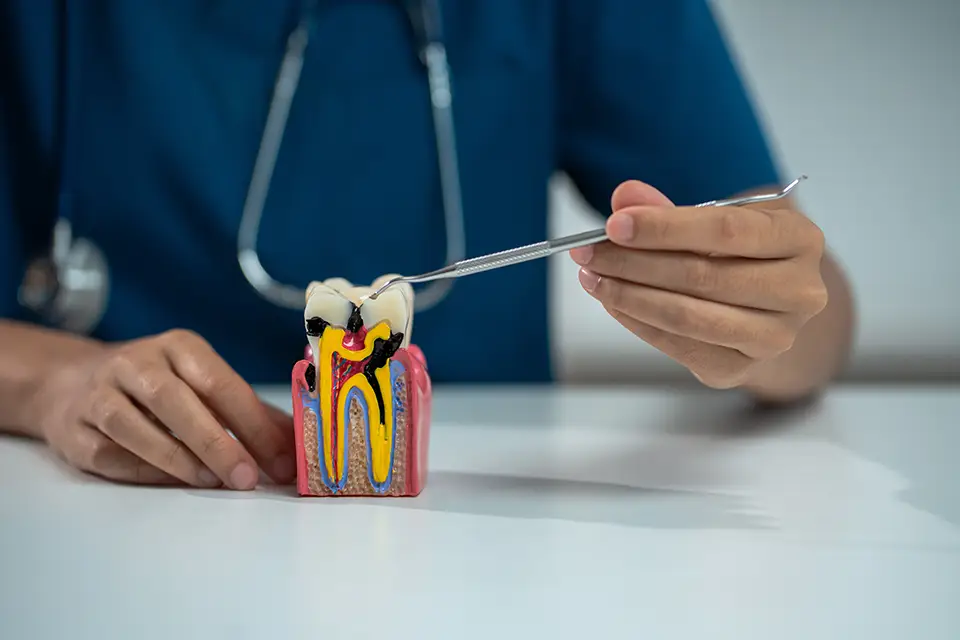If you’ve ever experienced tooth pain or discomfort, you might have wondered if you have a root cavity. Understanding what a root cavity is, how it forms, and how to treat it can help you maintain good oral health. At Sunshine Dentistry in Richmond Hill, Ontario, we strive to educate our patients on all aspects of dental care.
What is a Root Cavity?
A root cavity is a type of dental decay that primarily affects the roots of your teeth. This type of cavity typically develops when the gums recede, exposing the vulnerable root surfaces lacking the protective enamel layer on the tooth’s crown. In addition, without this protective enamel, the exposed roots are more susceptible to decay, resulting in root cavities. Maintaining good oral hygiene is critical, especially as we age and are more likely to experience gum recession.
Causes
A root cavity can form due to a variety of factors, including:
- Gum Recession: As gums recede due to age or periodontal disease, the roots of the teeth become exposed, increasing their susceptibility to decay.
- Poor Oral Hygiene: Inadequate brushing and flossing can cause plaque buildup, increasing the likelihood of developing cavities, including root cavities.
- Dry Mouth: Reduced saliva production, frequently caused by medications or certain health conditions, can lead to dry mouth, reducing the body’s natural ability to wash away bacteria and neutralize acids.
- Diet: Frequent consumption of sugary or acidic foods and beverages can erode tooth surfaces and form root cavities.
- Age: As we age, we are more likely to experience gum recession and dry mouth, which increase the risk of developing a root cavity.
Signs and Symptoms of a Root Cavity
They can cause a variety of symptoms, including:
- Tooth Sensitivity: Pain or discomfort while eating hot, cold, or sweet foods may indicate a cavity.
- Visible Decay: You may see discoloration or dark spots near the gumline.
- Gum Discomfort: Swollen or receding gums around the affected tooth may indicate a cavity.
- Toothache: Persistent tooth pain, mainly when chewing, may indicate a cavity that has progressed to the tooth’s root.
If you experience any of these symptoms, you should see your dentist for a thorough examination.
Treatment for Root Cavity

Treating a root cavity often depends on the extent of the decay. Here are some common treatment options:
- Fluoride Treatment: For early-stage cavities, fluoride treatments can help remineralize the affected area and stop decay progression.
- Dental Fillings: If the decay has progressed beyond the early stages, a filling may be necessary to save the tooth.
- Root Canal Therapy: Where the cavity has penetrated the tooth’s pulp, a root canal treatment may be necessary to extract the infected tissue and preserve the tooth.
- Crown Placement: For more severe damage, a dental crown may be placed on the tooth after a root canal to provide additional protection and restore functionality.
Prevention Tips for Root Cavity
Maintaining good oral hygiene and a healthy lifestyle are key to preventing root cavities. Moreover, here are some suggestions to help you avoid them:
- Brush Twice Daily: Use fluoride toothpaste to protect your teeth and lower your risk of cavities.
- Floss Regularly: Flossing helps remove plaque from areas a toothbrush cannot reach, particularly near the gumline.
- Use Mouthwash: An antibacterial mouthwash can help reduce plaque and bacteria in the mouth, two major contributors to cavity formation.
- Regular Dental Checkups: Visiting your dentist regularly for cleanings and exams allows for the early detection of any dental problems.
- Limit Sugary Foods and Beverages: Limiting your sugary and acidic food intake can help prevent erosion and decay.
Why Visit Sunshine Dentistry?
Sunshine Dentistry in Richmond Hill, Ontario, offers comprehensive dental care to help patients maintain healthy smiles. Moreover, our experienced team can diagnose and treat root cavities and other dental issues. We use a personalized approach to ensure that each patient receives the best possible care. Whether you require a simple fluoride treatment or more involved procedures such as a root canal, our dedicated professionals are here to assist.
FAQs
1. Can root cavities heal on their own?
No, they cannot heal on their own. It necessitates professional care to prevent further damage and restore the tooth.
2. How can I tell if I have a root cavity?
Symptoms may include sensitivity to hot, cold, or sweet foods, visible discoloration, and tooth pain near the gumline. A dental exam is needed for a proper diagnosis.
3. Are they more common in older adults?
They are more common in older adults due to increased gum recession and a higher likelihood of dry mouth, both of which promote root decay.
Untreated root cavities can cause significant tooth pain and damage. Understanding the causes, symptoms, and treatment options allows you to take steps to protect your dental health. Furthermore, if you suspect you have a cavity or want to learn more about prevention, visit Sunshine Dentistry in Richmond Hill, Ontario, today. We are here to keep your smile healthy and bright!



